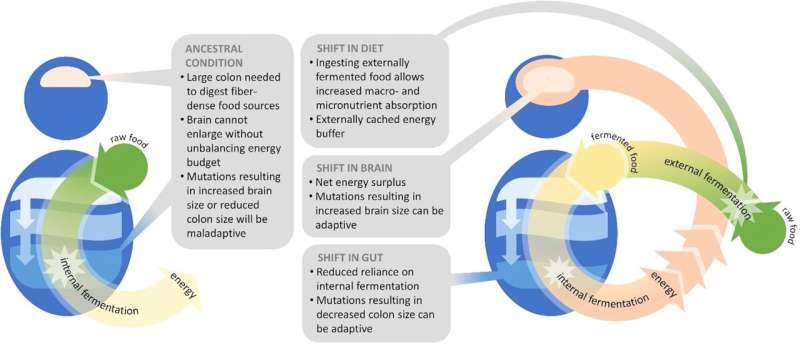December 4, 2023 report
This article has been reviewed according to Science X's editorial process and policies. Editors have highlighted the following attributes while ensuring the content's credibility:
fact-checked
peer-reviewed publication
trusted source
proofread
Researchers suggest use of natural fermentation may have led to early human brain size increase

A trio of researchers with varied backgrounds is suggesting in an article published in the journal Communications Biology that eating naturally fermented foods may have led to an increase in brain size for early humans. In their paper, Katherine Bryant, an evolutionary neuroscientist at Aix-Marseille Université, Christi Hansen, a dietician at Hungry Heart Farm and Dietary Consulting, and Erin Hecht, a biologist at Harvard University, suggest that eating naturally fermenting foods may also have led to a decrease in the size of the colon.
Prior research has shown that the brain size of humans has increased dramatically over the past 2 million years, and during the same period, the human colon has decreased in size by approximately 74%. The researchers say the two changes are likely connected and that both may have come about as early humans began eating foods that were naturally fermented.
The researchers note that fermentation occurs naturally in the gut—the process allows for extracting more nutrients from foods. They also note that it is an anaerobic process, which is why it can occur in an airless gut. They also point out that eating food that has already been fermented naturally would lessen the load on the gut, as would cooking it.
But cooking, they point out, requires some degree of fire management, which would require a larger brain than early man had evolved. Fermentation, on the other hand, happens naturally. To benefit from it, early humans would not have had to do anything more than pile new food on top of already fermenting food in hidden places—like nooks and crannies in a cave, or even a hole in the ground. Notably, putting food in a hole in the ground could easily have started as a means of preventing other animals or even people from finding and eating it.
As humans began eating more fermented food, the researchers suggest, their gut organs began to shrink. As the shrinking gut used less energy, more energy extracted from the food could be used by the brain. That could have led to brain growth and the cognitive abilities that went along with it. From there, the larger brain could have allowed for learning how to ferment foods intentionally, leading to even smaller colons and larger brains.
More information: Katherine L. Bryant et al, Fermentation technology as a driver of human brain expansion, Communications Biology (2023). DOI: 10.1038/s42003-023-05517-3
Journal information: Communications Biology
© 2023 Science X Network





















